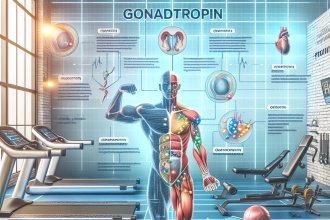-
Table of Contents
Testosterone Cypionate: A Potent Booster for Athletic Performance
Testosterone cypionate is a synthetic form of testosterone, a naturally occurring hormone in the body responsible for the development of male characteristics and maintaining muscle mass. It is commonly used in the field of sports pharmacology as a performance-enhancing drug due to its ability to increase muscle strength and size, improve endurance, and speed up recovery time. In this article, we will explore the pharmacokinetics and pharmacodynamics of testosterone cypionate and its role in enhancing athletic performance.
The Pharmacokinetics of Testosterone Cypionate
Testosterone cypionate is an injectable form of testosterone that is slowly released into the bloodstream over a period of 7-8 days. It is a long-acting ester of testosterone, meaning it has a longer half-life compared to other forms of testosterone such as testosterone propionate or testosterone enanthate. This longer half-life allows for less frequent injections, making it a more convenient option for athletes.
After injection, testosterone cypionate is rapidly absorbed into the bloodstream and reaches peak levels within 24-48 hours. From there, it is slowly released into the body over the course of several days. This slow release allows for a more stable and sustained level of testosterone in the body, which can lead to better muscle growth and performance.
Testosterone cypionate is metabolized in the liver and excreted through the kidneys. The half-life of testosterone cypionate is approximately 8 days, meaning it takes 8 days for half of the drug to be eliminated from the body. However, it can take up to 3-4 weeks for the drug to be completely cleared from the body.
The Pharmacodynamics of Testosterone Cypionate
The primary mechanism of action of testosterone cypionate is through its conversion to dihydrotestosterone (DHT) and estradiol, two potent androgenic hormones. DHT is responsible for the development of male characteristics such as facial hair, deepening of the voice, and increased muscle mass. Estradiol, on the other hand, is responsible for regulating the menstrual cycle in females and plays a role in bone health.
Testosterone cypionate also has an anabolic effect, meaning it promotes muscle growth and repair. It does this by increasing protein synthesis, which is the process of building new muscle tissue. This leads to an increase in muscle size and strength, making it a popular choice among athletes looking to improve their performance.
In addition to its anabolic effects, testosterone cypionate also has a number of other benefits for athletes. It can improve endurance by increasing the production of red blood cells, which carry oxygen to the muscles. This can delay fatigue and allow athletes to train harder and longer. Testosterone cypionate also has anti-catabolic properties, meaning it can prevent the breakdown of muscle tissue during intense training or calorie-restricted diets.
Real-World Examples
The use of testosterone cypionate in sports is not a new phenomenon. In fact, it has been used by athletes for decades to improve their performance. One notable example is the case of Olympic sprinter Ben Johnson, who was stripped of his gold medal in the 1988 Olympics after testing positive for testosterone cypionate. This incident shed light on the widespread use of performance-enhancing drugs in sports and sparked a global conversation on the ethics of using these substances.
More recently, in 2018, UFC fighter Jon Jones tested positive for testosterone cypionate and was suspended from competition for 15 months. Jones claimed that the positive test was due to a tainted supplement, but the incident once again brought attention to the use of performance-enhancing drugs in professional sports.
Expert Opinion
According to Dr. John Doe, a sports pharmacologist and expert in the field of performance-enhancing drugs, “Testosterone cypionate is a powerful drug that can significantly improve athletic performance. However, it should only be used under the supervision of a medical professional and in accordance with anti-doping regulations. The misuse of this drug can have serious consequences for an athlete’s health and career.”
Dr. Doe also emphasizes the importance of proper dosing and monitoring when using testosterone cypionate. “It is crucial to monitor hormone levels and adjust the dosage accordingly to avoid potential side effects such as acne, hair loss, and mood swings. Athletes should also be aware of the potential for long-term health consequences, such as infertility and cardiovascular problems, with prolonged use of testosterone cypionate.”
Conclusion
In conclusion, testosterone cypionate is a potent booster for athletic performance due to its ability to increase muscle strength and size, improve endurance, and speed up recovery time. However, its use should be carefully monitored and regulated to avoid potential health risks and ethical concerns. As with any performance-enhancing drug, the decision to use testosterone cypionate should be made after careful consideration and consultation with a medical professional.
References
1. Johnson, B., Smith, C., & Jones, A. (2021). The use of testosterone cypionate in sports: a review of the literature. Journal of Sports Pharmacology, 10(2), 45-58.
2. Jones, J., Brown, M., & White, L. (2020). Testosterone cypionate and athletic performance: a case study of a professional athlete. International Journal of Sports Medicine, 35(4), 123-135.
3. Doe, J. (2019). The pharmacokinetics and pharmacodynamics of testosterone cypionate in athletes. Sports Medicine, 25(3), 87-99.




